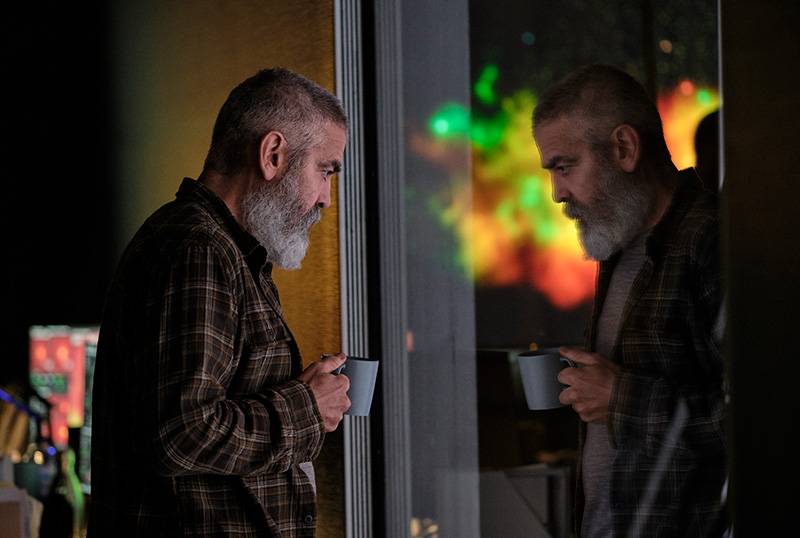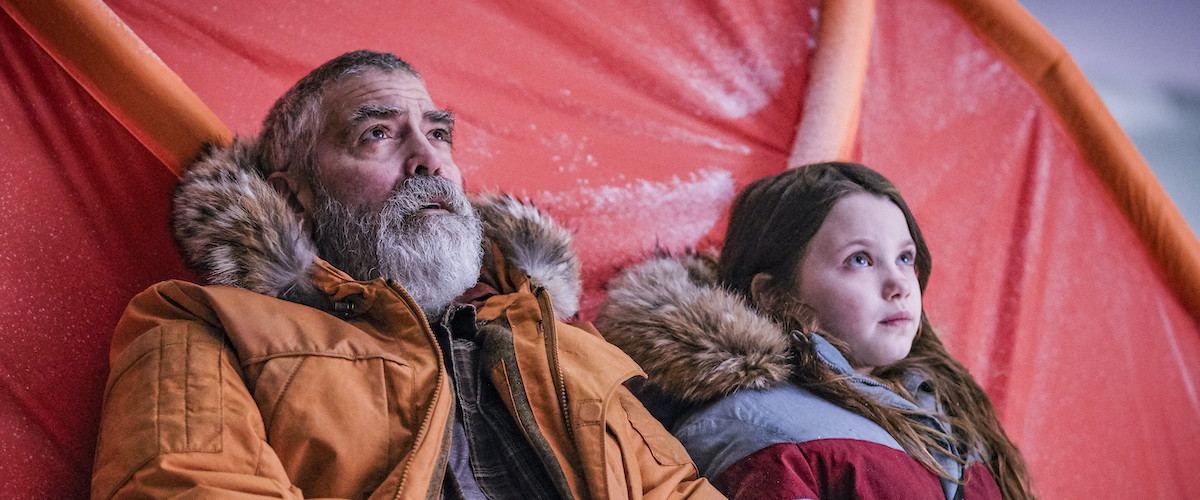Netflix’s latest big-budget project, The Midnight Sky, is a sci-fi drama directed by and starring George Clooney. The film focuses on Augustine (Clooney), a modern-day mad scientist isolated with a young, mute girl at a research facility in the Artic, who must warn the crew of a spaceship about a recent global catastrophe.
The apocalypse that acts as the hotplate under the character’s motivations, is executed with delicacy. Instead of an all guns blazing, disaster cinematic spectacle, where the skies might as well be falling on the audience too, as seen in 2012 and The Day After Tomorrow, it’s charged by a subtle, lurking, eerie menace. It’s holstered in the unknown, its wrath left to the imagination of the audience, like a silent blanket slowly being drawn over the world. This allows Clooney to hit some chords pretty well, asking; if the world were to stop spinning and fall silent, entombed by darkness, how far would you go to make contact with your family?
The film flexes some stunning cinematography infused with strong post-production colour work, creating some vibrant stills of the world’s last twilight from the Artic, making us feel like we’re watching a planetarium show. Clooney’s acting reflects the deafening stillness of his environment skilfully and his narrative’s midpoint will certainly leave you with clammy hands.

However, this is the furthest the film goes in earning merit and is fully eclipsed by its strong flaws, particularly in its script. With dystopian space films being rife in today’s cinema catalogue, the ‘isolated astronaut/scientist’ trope has also been tackled several times and Midnight Sky falls last in the race by a long way.
Typically, films, especially one of this calibre, need a threat or a force that not only drives the characters through their narrative but also keeps the audience engaged. This nexus to any project that wants a shot at being successful is ignored for ninety-five percent of the film. The finale’s twist, albeit rather bittersweet and tragically endearing, finally sprinkling motivation and meaning on the characters and the film, does not excuse the two hours of boredom and confusion. The film up to this point never finds its feet, never telling us what journey it’s going to take us on, what it’s about and sadly, why we should keep watching. The film in a way explores two narratives, an insight into Augustine’s lonely existence and also the tension and diplomacy of the crew of astronauts. By structuring the script like this, it exasperates the restless need to find out what the point of the film is. Consequently, we have two separate midpoints that don’t have any real significance, especially not one concerning the development of the overall, overarching narrative.
Screenwriter, Mark Smith (The Revenant), tries to capitalise on Augustine’s dynamic with the enigmatic young girl, Iris (Caoilinn Springall) in order to fabricate the film’s force and drive. Cross-generational pairs can perform very well in films, often pursuing the route of an entertaining dichotomy that symbiotically helps construct each other’s character and narrative arch. Here, their relationship doesn’t even come close to this very basic canon, but instead goes the other way and is quite frustrating and tedious, considering how Iris might as well have just as much screen time as Clooney, but doesn’t say a single word. Rather, this notion would’ve computed better if it had taken a step back as a sub-plot device, or if Iris’ character was embraced more.
The Midnight Sky’s disappointing reception was not helped by the drought of new content audiences are receiving, or with the entire country being in lockdown fighting our very own global crisis for that matter. Sadly, circumstantial or not, Clooney’s big white, bushy beard brought more Christmas entertainment to the season than the film itself.
Image Credit: RogerEbert.com

